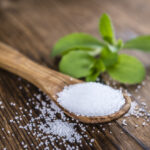Breast cancer health news: Stevia is the safest sweet choice
 (NaturalHealth365) Is there a connection between sugar (plus artificial sweeteners) and cancer? Let’s take a closer look.
(NaturalHealth365) Is there a connection between sugar (plus artificial sweeteners) and cancer? Let’s take a closer look.
It drives me crazy when I hear oncologists and medical physicians say that there is no connection between sugar consumption and cancer. After all, the very technology conventional doctors use to detect cancer is based on the premise that cancer LOVES sugar!
Before a PET (Positron Emission Tomography) scan, the patient is injected with a radioactive sugar solution. Since cancer has 46 insulin receptor sites (compared to 2 on a healthy cell), the cancer cells gobble up the radioactive sugar solution first. The end result is an image with little light bulbs glowing in areas of the body that are afflicted with cancer cells.
Let me put it bluntly: if you have breast cancer, stay away from sugar – period. This is the first and perhaps one of the best things you can do on your cancer-healing journey.
Shocking reality: Sugar consumption is out of control
Our ancestors ate sweet substances every once in a while as a rare delicacy, and a mere 100 years ago, Americans, on average, consumed only 4 pounds of sugar a year. Between 1970 and 2000, however, Americans added more sugar to their diets every year (after 2000, it was replaced with artificial sweeteners, which is a whole other story). Still today, the average American consumes an average of 150-170 pounds per year.
Besides its addictive attributes, the overconsumption of sugar has to do in large part with the way sugar is hidden in hundreds of consumer food goods we buy every day. Some of the sources of sugar are well known. These include brown sugar, honey, agave, high fructose corn syrup, maple syrup, molasses, sugar alcohols like xylitol, and, of course, plain old white table sugar.
But other substances with high glucose levels can sneak up on you. The 2010 USDA Fact Book states: “In a sense, sugar is the number one food additive. It turns up in some unlikely places, such as pizza, bread, hot dogs, boxed mixed rice, soup, crackers, spaghetti sauce, lunch meat, canned vegetables, fruit drinks, flavored yogurt, ketchup, salad dressing, mayonnaise, and some peanut butter.”
Stevia offers good news for sugar lovers
Before the panic sets in, let me tell you the good news. There are healthy alternatives to high-glucose substances that feed cancer and to artificial sweeteners that add toxicity to your body. One of these alternatives is Stevia.
Stevia is part of the Asteraceae family. It is related to the daisy and ragweed as well as to a plant called “candy leaf,” which is native to the American Southwest. Most Stevia natural sweeteners in production today, however, come from Stevia rebaudiana, which has been used in Paraguay and Brazil for hundreds of years as a sweetener and also as a remedy for ailments such as burns, colic, and upset stomach.
Unlike the use of artificial sweeteners, which research done with rats has shown eventually leads to overeating and even diabetes, no evidence has connected the consumption of Stevia with these conditions. In fact, recent studies have found promising results for Stevia’s role in the reduction of sugar-related ailments.
What you need to know about Stevia
If you decide to give Stevia a try, be sure to purchase and use pure Stevia leaf, either in concentrate as a liquid or in powder form. Other natural sweeteners on the market, such as Truvia, are a mixture of Stevia and other ingredients like sugar alcohols and “natural flavors.”
In addition, some products that say they are Stevia-sweetened may be telling a half-truth. For example, Coca-Cola Life contains a mixture of Stevia and cane sugar. Finally, be mindful if you use Stevia for baking or sweetening drinks. Even though Stevia has no calories, it is approximately 100 times sweeter than sugar, so a little goes a long way.
You CAN take control of your breast cancer and learn to heal your body naturally. Cutting out all forms of sugar from your diet and adding natural alternatives like Stevia is a giant step in the right direction.
About the Author: Dr. Veronique Desaulniers (“Dr. V”) is a best-selling author and specialist in Chiropractic, Bio-Energetics, Meridian Stress Analysis, Homeopathy, and Digital Thermography. After 30 years in active practice, she decided to “retire” and devote her time to sharing her personal, non-toxic Breast Cancer healing journey with others. Learn more about Dr. V at: BreastCancerConqueror.com
Sources for this article include:



